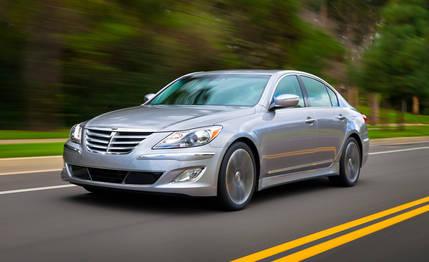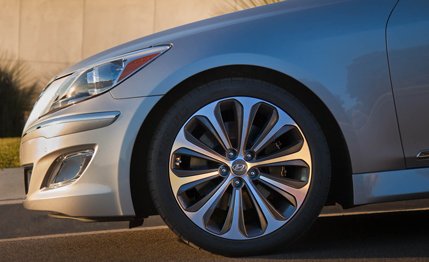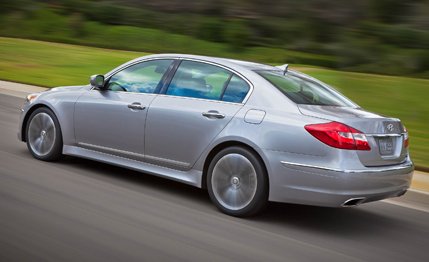 Instrumented Test
Instrumented Test
What Is It?
The Genesis sedan is the second Hyundai to get the R-Spec treatment; here it’s the top-shelf trim, powered by a 5.0-liter version of the company’s Tau V-8. (In contrast, the other R-Spec is a stripped-out Genesis coupe.) Output in the R-Spec four-door stands at 429 hp and 376 lb-ft of torque; it’s routed through an eight-speed transmission that Hyundai developed in-house. The R-Spec also features larger front brakes, recalibrated steering, and a sturdier rear anti-roll bar.
Visual distinction from lesser models is provided by unique 19-inch wheels, headlamps with darkened-chrome inserts, and an R-Spec badge on the decklid. So the R-Spec still looks largely the same as its brethren, which means it also looks out of step with the more-flowing lines of Hyundai’s newer models. A limited palette of available paints (black, silver, and, uh, darker silver) and interior colors (just black) don’t particularly help curbside presence, but the car is handsome enough.
How Does It Drive?
Compared with our 100,000-mile Genesis V-8 long-termer—it used the smaller 375-horse, 4.6-liter Tau, which is still on offer—the 4234-pound R-Spec carries 115 more pounds. The newer model was slightly quicker in a straight line: We squeezed a 5.1-second 0-to-60 time from the R-Spec and covered the quarter in 13.7 seconds at 103 mph. Our long-termer’s initial test numbers read 5.3 and 13.8 at 104. The chassis tweaks and sticky, optional Bridgestone Potenza S-04 Pole Position tires increased lateral grip from 0.84 g to 0.87. The rubber did nothing to improve the 70-to-0-mph braking figure; both the long-termer and this car posted 164-foot efforts.

A more significant improvement, however, can be felt behind the wheel. Whereas our long-termer flopped into corners and crashed and clopped over expansion joints, the R-Spec offers much-improved body and wheel control, and never gets overly harsh. That isn’t meant to imply that this luxocruiser is now a bona fide sports sedan, however. The steering is sharper and more responsive, but it remains artificial in feel; the stability-control system cannot be deactivated and hinders performance at the limit; and the new transmission is slow to respond in either automatic or manual mode. The eight-speed’s reticence might be forgiven if it meant improved fuel economy, but we saw just 16 mpg over 1200-plus miles of mixed driving. That’s far below the 23 mpg achieved by our long-termer and its six-speed auto, and in the cellar of the R-Spec’s EPA city/highway ratings of 16/25.
How Does It Stack Up?
The Genesis tantalized upon its 2009 introduction, offering commendable power, performance, and luxury at a price well below those of the established Europeans, most notably the Mercedes-Benz E-class and the BMW 5-series. Despite its racy moniker, though, the R-Spec is not Hyundai’s take on a BMW M, Mercedes AMG, or even a Cadillac V; this Genesis lacks the pace, refinement, and road manners to run with such high-performance, high-dollar specials. In truth, it is American iron that provides the clearest competition—most European intenders aren’t getting into a Hyundai no matter the cost savings.

Chrysler’s new-for-2011 300C feels a bit more connected to the road, while that car’s big brother, the 300 SRT8, is more of an enthusiast sled than the Hyundai with its 470-hp, 6.4-liter V-8 and more-focused underpinnings. A Lincoln MKS equipped with the twin-turbo, 355-hp EcoBoost V-6 offers similar performance and standard all-wheel drive—the Genny won’t get all-wheel drive until its next full redesign—but has less space inside and easily tops $50K. The MKS also trails the Hyundai in driving enjoyment, although it has been refreshed with more standard power and upgraded brakes for 2013.
What’s the Cost?
Stepping up to the $47,350 R-Spec incurs a reasonable $2000 premium over a Genesis 4.6, and our $48,785 test car added the summer tires ($1400) and an iPod cable ($35). The Hyundai is one of the largest and most muscular luxury sedans available for less than 50 grand, and its sticker undercuts those of the even the six-cylinder Audi A6 3.0T, BMW 535i, and Mercedes E350. The R-Spec looks like less of a value, however, next to the $38,995 300C (available with AWD for an additional $2150) or the burly SRT8, which starts at $49,025 and can hit 60 mph in 4.4 seconds. Still, with a long features list, its agreeable pricing, and much-needed refinements over previous Genesis sedans, the R-Spec is certainly compelling. Just don’t go thinking that R in R-spec means “Race,” okay?